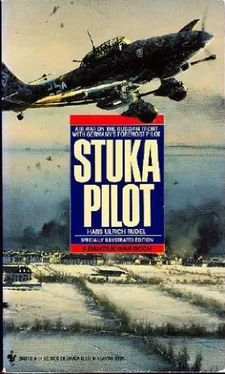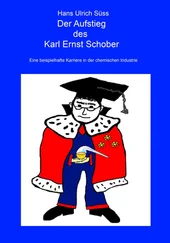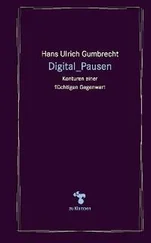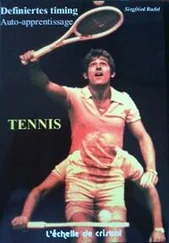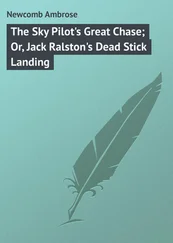Our billets are in a barracks a few miles below the airfield on the outskirts of Varpalota. The next day between sorties I am lying on my bed for a little rest when I hear a roar of aircraft: those are no German planes. At an angle through the open window I catch sight of a Russian Boston formation flying at 1200 feet. They are coming straight towards us. Now they are already screaming down, the bombs. Even with sound legs I could not have been more quickly on the floor. A heavy bomb bursts fifteen yards in front of my window and blows to bits my B.M.W. car, which was waiting there for me. Dahlmann, who comes in at the door opposite the window at that very moment to warn me of the alert, suddenly finds the window frame round his neck. He gets off with a shock but no further damage. Ever since he has taken to crawling about with bent shoulders and a crab-apple face like a little old man. Evidently he no longer thinks much of war and we laugh every time we see this youngster in his new role.
Presently, with our support from the air, there is a lull in the Lake Balaton area, but to the East the Soviets have bypassed Budapest and reached the Gran River north of the Danube. South of Budapest they have pushed out of their bridgeheads, and co-operating with forces thrusting N.W. from the south have gone over to the offensive. The spearheads of their advance are on the eastern edge of the Vecec mountains north of Stuhlweissenburg, so that Budapest is encircled. Some of our sorties are flown in this area or even further eastward. We try to disrupt their communications far behind the front in the Hadvan area, where Soviet supply trains are already running. In this rush of events we soon become maids of all work: we are dive bombers, attack planes, fighters, and reconnaissance aircraft.
The battle for the relief of Budapest is in full swing. We are now stationed at Kememed St. Peter in the Papa area. We, the flying personnel, have just got in from the airfield at Varpalota, and before we have even had time to settle down Fridolin pops his head in and asks: “Don’t you chaps know it’s only two days to Christmas?” He is right; according to the calendar it must be so. Take-off—sortie—land—take-off—sortie—land, that has been our rhythm; day in, day out—for years. Everything else is absorbed into this rhythm: cold and heat, winter and summer, weekdays and Sundays. Our lives are condensed into a few ideas and phrases which fill our minds and refuse to be dismissed, especially now that the war has indeed become a struggle for survival. One day follows another, the breath of today the same as that of yesterday. “Sortie!” “Where to?” “Against whom?” “Met.” “Flak.” These words and thoughts preoccupy the very youngest pilot just as they do the Wing Commander. Will it go on like this forever?
So the day after tomorrow will be Christmas. Fridolin with one of the administrative staff drives over to Group
Headquarters to fetch our Christmas mail. Meanwhile greetings to the “Immelman Circus” come in even from army units. We return from our last sortie on Christmas Eve at five o’clock. The place looks really Christmassy, gay and festive, almost like home. As there is no large hall available, each flight has its own celebrations in the biggest room in their headquarters. I drop in on them all. Every unit observes the occasion in its own fashion, reflecting the personality of its skipper. It is jolly everywhere. I myself spend the greater part of Christmas Eve with the Wing staff company. Here, too, the room is festively decorated with mistletoe and holly, and cheerful in the light of many candles. Two large Christmas trees with a table covered with presents set up in front of them remind us of our childhood. My soldiers’ eyes are bright pools of nostalgic dreams, their thoughts are with wife and child at home, with parents and families, in the past and in the future. Only subconsciously do we perceive among the green the German flag of war. It jerks us back to reality: we are celebrating Christmas in the field. We sing “Stille Nacht, Heilige Nacht” and all the other Christmas songs. The raucous military voices blend in a softer euphony. Then the great miracle happens in our hearts: the thoughts of bombs and targets, shells and flak and death are softened by an extraordinary sense of peace, of serene and soothing peace. And we are able to think of sublime and beautiful things with the same ease as we think of walnuts, punch and pfefferkuchen . The final echo of the lovely German Christmas carols has died away. I say a few words about our German Christmas, I want my men to see me today, above all, as their comrade, not their commanding officer. We sit together happily for another hour or two; then Christmas Eve is over.
St. Peter is kind to us on the first day of the holidays: there is a dense fog. From conversations over the telephone during Christmas I know that Ivan is attacking and that we are urgently needed, but flying is absolutely impossible. The next morning I play a short game of ice hockey with my men, which this time means standing in goal in my fur boots as with my five weeks old wounds I can do no more than hobble clumsily about. Skating is out of the question. In the afternoon I am invited with a few colleagues by the people on which I am billeted to a shoot. I know very little about this “common or garden” shooting on terra firma . Our party consists of a large number of guns, but only a very few beaters. The hares know that the odds are on their side and invariably dart through the wide gaps in our “pocket” in the nick of time. Wading through the deep snow does not admit of any very rapid progress either. My driver, L.A.C. Bohme, is on my flank. All of a sudden I see a magnificent specimen of a hare break out of cover in his direction. Pointing my gun, I swivel round like a born hunter, close one eye, and… bang! I pull the trigger. A body rolls over, not the hare, but Bohme whom in my novice enthusiasm I have entirely overlooked. He is still mistrustful of my intentions, for he looks at me out of the snow with an expression of dismay and says reproachfully: “Really, sir!” He had noticed my aim in time and thrown himself flat in a flash. The buckshot missed him, but also the hare. Afterwards I am more scared by what happened than either of them. That would have been a Christmas surprise indeed. Another confirmation of the truth of our old Stuka maxim: “Nothing comes off-except what you have practiced.”
The following morning we have at last good flying weather. Ivan is early abroad; he raids our airfield. Again their bombing is pitifully bad, it is a disgrace. Their low level attacks stop at 1200 feet; we suffer practically no damage. We are out the whole of the second holiday to relieve the ground forces up in the N.E. on the River Gran and on the rest of the Budapest front. Our peaceful Christmas mood has been dispelled. The rigors of war envelope us again, the quiet cheerfulness of the peace of Christmas Eve has passed into the limbo of yesterday.
Fierce battles are raging in the air and on the ground. On our side fresh reinforcements have been thrown in, all old acquaintances of mine—friends from the Eastern Front, tank-men who, like ourselves, are the High Command’s “fire brigade.” Their task and ours will be to “punch a way out” for those parts of our divisions which are trapped in Budapest, to open a lane for them to rejoin the rest of the army. Together we should be able to pull the chestnuts out of the fire. Year in, year out, almost day by day, I have fought in every sector of the Eastern Front; I fancy that I have gained a fair knowledge of military tactics. Experience teaches that practice makes perfect; practical knowledge is the sole criterion of what is possible or impossible, good or bad. Through our daily flying we have learnt to know every ditch, every stretch, of country thoroughly, we are constantly low above them. It is quite impossible to approve of the conduct of the battle here.
Читать дальше
